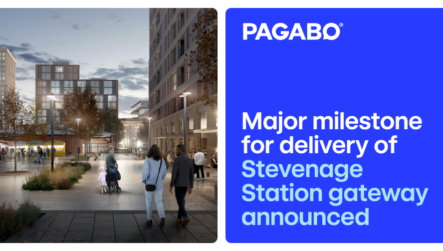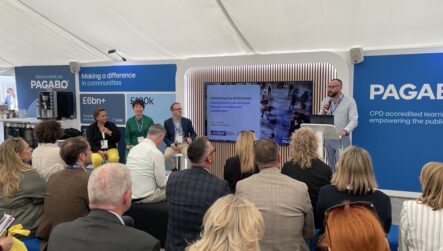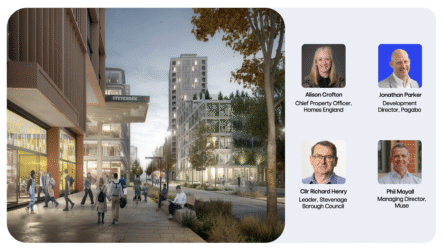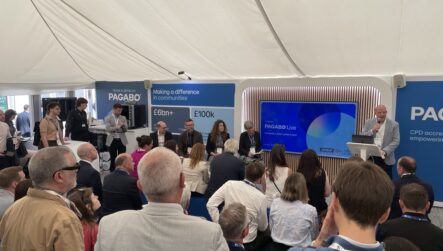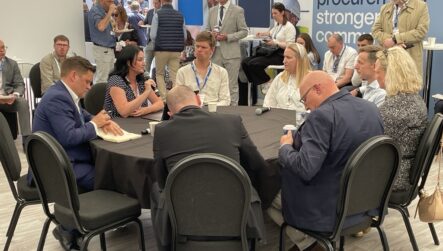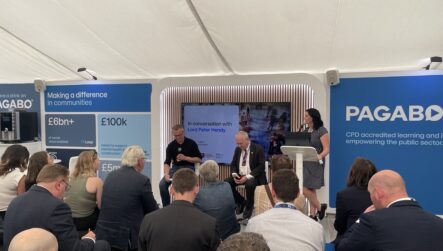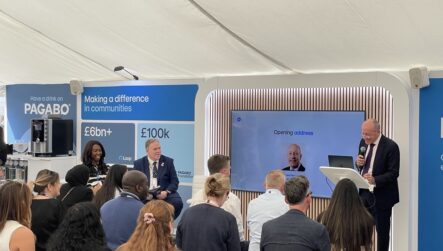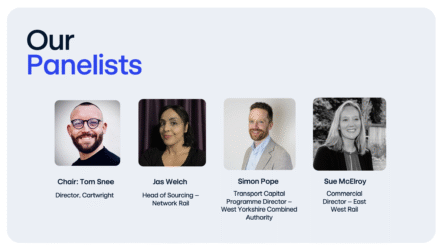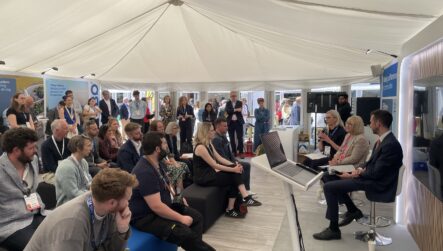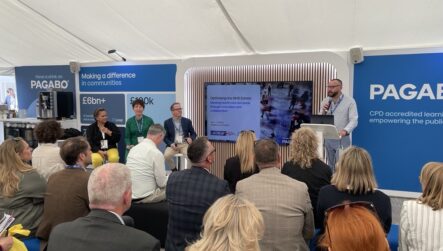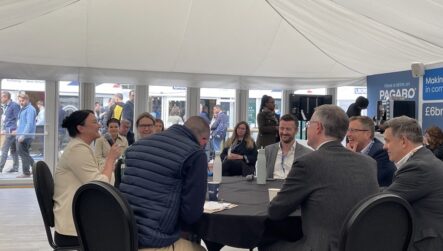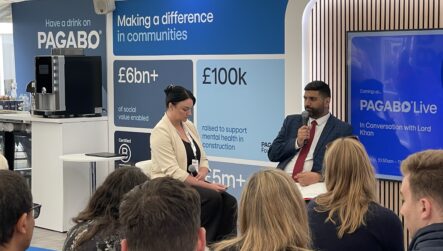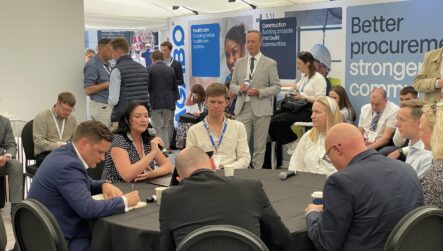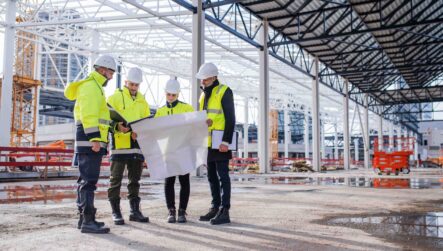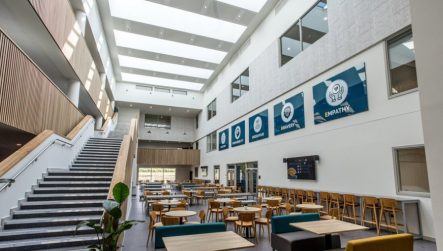Insight Report | Pagabo Live: Greener Deals, Greater Impact – Rethinking Procurement For Infrastructure That Lasts

From decarbonisation to social value, the demands on infrastructure have never been greater – or more complex. They are now not just expected to be more in terms of physical scale but also deliver more social impact too.
Procurement can be a linchpin in delivering greener infrastructure that delivers tangible outcomes for places, the planet, and people too. But what is the key to making sure it meets its full potential in doing so?
Led by our host Tom Snee of Cartwright, Pagabo Live hit the big stage at UKREiiF 2025, with the panel featuring Jas Welch, head of sourcing at Network Rail for the Transpennine Route Upgrade (TRU), Simon Pope, transport capital programme director at the West Yorkshire Combined Authority, and Sue McElroy, commercial director at East West Rail.
Together, these three key experts on large-scale transport schemes explored their shared learnings, and procurement’s vital role at the heart of greener, more innovative delivery.
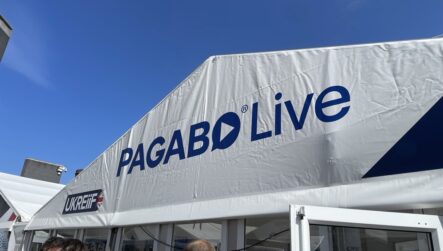
Transformational programmes, shared challenges
Our panellists all came to the discussion with a slightly different perspective but were united in the scale of opportunity – and responsibility – facing the transport sector, setting the scene through the projects they lead.
Jas detailed the unique challenge of delivering a £11.5bn programme of upgrades to 76 miles of railway, including bridges, tunnels, level crossings and 23 stations – all in a live operating environment. Beyond practicalities, future success will be measured on what the overall scheme delivers, and that’s why sustainable social value has been built into how procurement is shaped for this large-scale scheme.
Meanwhile, East West Rail is aiming to improve connectivity and reduce travel times through a new rail line and stations, along with upgrades to existing lines too. For Sue, East West Rail is about more than delivering just a railway. It’s a catalyst for unlocking regional economic growth and social mobility – ultimately being about “what it delivers when it’s delivered.” She underscored the difficulty of balancing the challenges of cost and delivery in complex infrastructure environments with the overarching objective: building vibrant, connected communities.
Coming at the discussion from the slightly different perspective of a combined authority, Simon discussed the broad remit of West Yorkshire’s capital programme, which spans active travel corridors to early-stage tram network planning. Acting as both a scheme promoter and funder, the main challenge faced here is balancing the short-term delivery pressures with the long-term need for regional economic uplift.
Across the board, panellists agreed: delivering this infrastructure is only part of the story. Ensuring it generates long-term social and economic return is the real test.
Procurement as a catalyst for innovation
Throughout the session, a recurring theme emerged – the critical role of procurement in enabling innovation, not just in products, but in process.
Rather than treating innovation as a bolt-on or retrospective consideration, panellists argued for building it into projects parameters from the outset. Jas detailed an example from the TRU scheme, where Network Rail is rethinking how procurement events are structured, using early supply chain engagement to stress-test assumptions and identify opportunities to unlock efficiencies.
In practice, this means empowering partners to bring forward low-carbon tools and smarter methodologies – an approach that resonates with the West Yorkshire Combined Authority. Recognising that innovation often emerges from supply chain collaboration, Simon explained how carbon considerations are being embedded into decision-making not just alongside cost, but as a fundamental measure of success. This approach is uniting the entire project team in delivering whole-life benefit, together.
Innovation must be driven by purpose, with Sue recognising the important role a client holds in defining what good looks like at the end of a project. Rather than prescribing solutions, the client’s role is to clearly define the outcomes, creating space for supply chain creativity – without that clarity, innovation may happen, but it may not end up being the most impactful result.
The commercial levers for sustainable placemaking
With so much focus on housing targets and economic growth from central government, the conversation turned to how infrastructure can better support place-based outcomes.
For all three panellists, sustainable placemaking is increasingly seen as a core procurement output. This means going beyond carbon to consider prosperity, community cohesion, and climate resilience – and designing commercial agreements that reward delivery of these outcomes.
Panellists pointed to the need for integrated strategies where designers, contractors, and clients are incentivised around shared goals – demanding a clear shift away from traditional silos and towards commercial models that reflect shared risk and reward. At East West Rail, market engagement is already shaping these models – aligning project ambitions with local plans and ensuring infrastructure is delivered to suit demand.
After all, railways will be there for a long time, and if they aren’t put in the right place, for the right level of passengers, in the right way – it cannot be the growth enabler it has the potential to be.
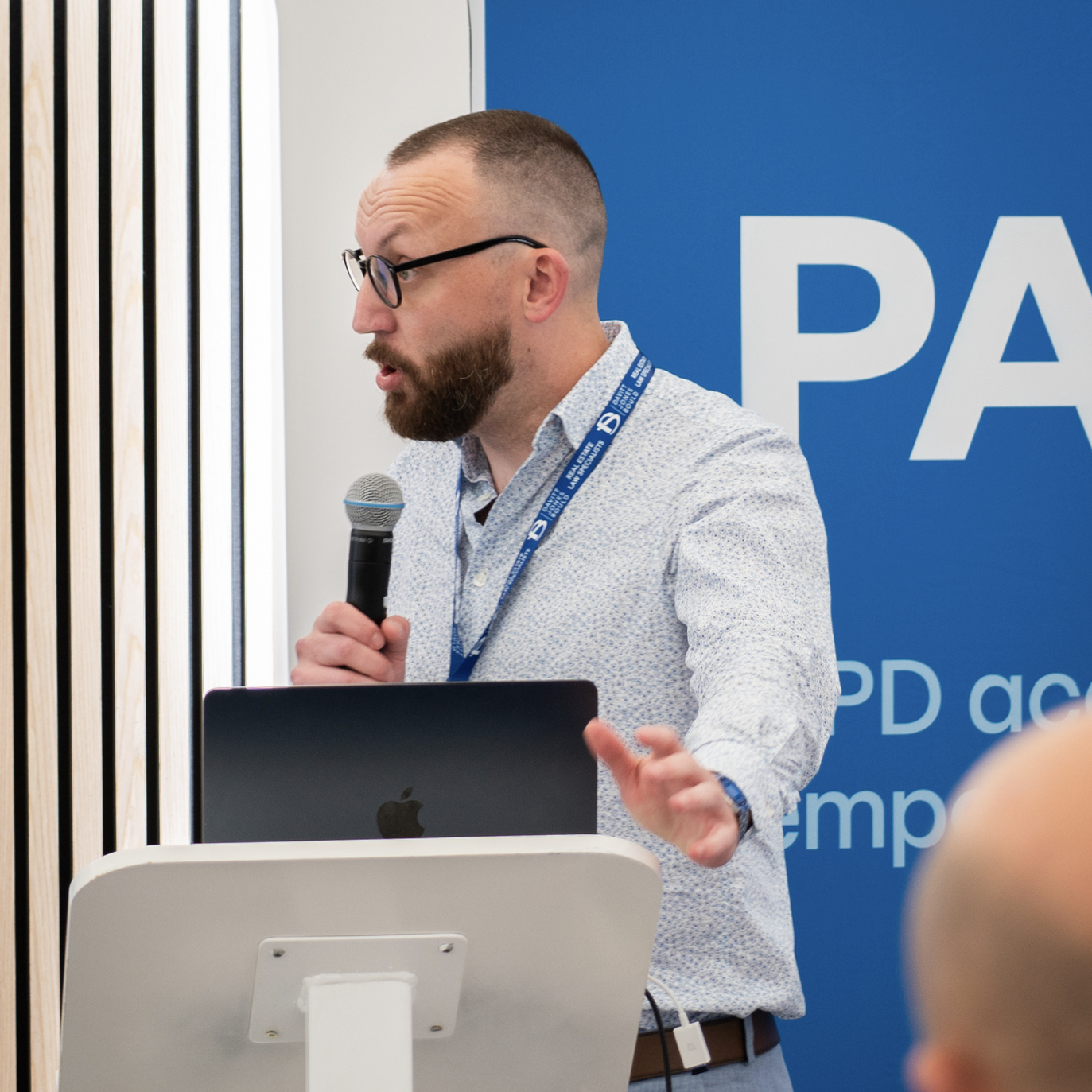
Transparent, measurable, accountable
Another point of agreement among panellists was that transparency and honest evaluation are key to driving progress.
For Network Rail, this is utilising external certifications like BREEAM to benchmark best practice and ensure a higher level of accountability – something particularly important for publicly-funded projects. With social value being a major focus for the TRU scheme, use of tools like the specialist Rail Social Value Tool(RSVT) developed by Loop and the Rail Safety and Standards Board (RSSB) allow accurate measurement of the wider impacts of its actions, such as 60% of the workforce being drawn from within 25 miles of the route.
Meanwhile, Simon detailed that the creation of meaningful KPIs is something that project leads and clients should drive, while industry standards like PAS 2038 are a helpful demonstration of capability from supply chain partners. However, innovation lies in taking a creative approach to challenges, rarely being found in ‘safe spaces’. So, while budgets can create tight parameters, there needs to be a willingness to not always get everything right – and scaling up as a collective will de-risk innovation and allow us to find the very best solutions to deliver a legacy.
From MEAT to MAT – a culture shift in progress
A drum that Pagabo has been beating for years, a notable shift is fully underway – further spurred on by recent procurement reform. With that move from Most Economically Advantageous Tender (MEAT) to Most Advantageous Tender (MAT), public bodies now have the mandate to priorities wider value indicators – from skills and sustainability to social value and health and safety. Weighting within tenders can be utilised to make it clear that sustainable delivery and tangible social value are non-negotiables.
As Simon put it, “there is no silver bullet – it’s about getting the balance right.” Now is the time to capitalise on the culture shift and make sure that we’re communicating the benefits better. Not everyone is as tuned into sustainability and social value terminology as those working on projects – but communicating these wider benefits effectively to stakeholders and the community will be vital, so language will continue to be important within engagement processes.
The panel made one thing clear: today’s infrastructure programmes are about far more than steel and concrete. They’re about building lasting legacies – and it’s through procurement that these ambitions will be realised.
But for procurement to truly deliver transformative outcomes, it comes back to clarity. As Sue stressed multiple times, “clients need to be crystal clear on what they want to achieve.” When that happens, procurement becomes a powerful strategic tool, not just a transactional necessity.
Coming up next…
Our next Pagabo Live session will be on Wednesday 18 June, focusing on how to navigate procurement effectively within the healthcare sector. Click here to register: https://pagabo.co.uk/pagabo-live/
Discover our frameworks
